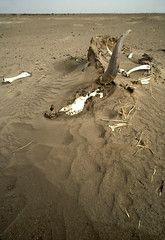 With ClimateProgress.org's Joe Romm linking Egyptian unrest over rising food prices to the climate crisis, Keith Kloor sneeringly dismisses Romm:
With ClimateProgress.org's Joe Romm linking Egyptian unrest over rising food prices to the climate crisis, Keith Kloor sneeringly dismisses Romm:Let the record state that Egyptians have previously taken to the streets over food. For example, there were the “bread riots” in 1977, and in recent years the food riots in 2008 (which hit other parts of the world, as well). Was global warming involved in these instances, too?Yeah, Joe! What now?
What's that you say? Maybe you should actually check if global warming contributed to an African crisis of the 1970s before using it in a taunt? I suppose:
In 2005, a series of climate modeling studies performed at NOAA / Geophysical Fluid Dynamics Laboratory indicated that the late 20th century Sahel drought was likely a climatic response to changing sea surface temperature patterns, and that it could be viewed as a combination of natural variability superimposed upon an anthropogenically forced regional drying trend.Using GFDL CM2.X, these climate model simulations indicated that the general late 20th century Sahel drying trend was attributable to human-induced factors; largely due to an increase in greenhouse gases and partly due to an increase in atmospheric aerosols. In IPCC future scenario A2 (CO2 value of ≈860 ppm) Sahel rainfall could be reduced by up to 25% by year 2100, according to climate models.Kloor concludes that he marvels "at the hubris of someone who sees a global warming angle to the Egyptian revolt."
OH SNAP! Who'd ever link global warming to political revolt?
Huh? The Penta-what-now?

No comments:
Post a Comment